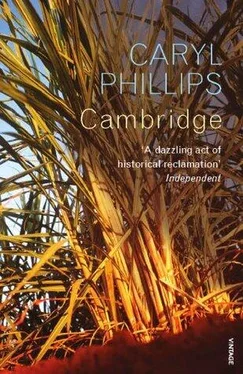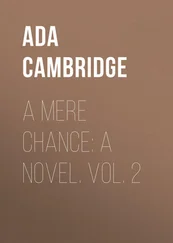Caryl Phillips - Cambridge
Здесь есть возможность читать онлайн «Caryl Phillips - Cambridge» весь текст электронной книги совершенно бесплатно (целиком полную версию без сокращений). В некоторых случаях можно слушать аудио, скачать через торрент в формате fb2 и присутствует краткое содержание. Год выпуска: 2009, Издательство: Vintage Digital, Жанр: Современная проза, на английском языке. Описание произведения, (предисловие) а так же отзывы посетителей доступны на портале библиотеки ЛибКат.
- Название:Cambridge
- Автор:
- Издательство:Vintage Digital
- Жанр:
- Год:2009
- ISBN:нет данных
- Рейтинг книги:5 / 5. Голосов: 1
-
Избранное:Добавить в избранное
- Отзывы:
-
Ваша оценка:
- 100
- 1
- 2
- 3
- 4
- 5
Cambridge: краткое содержание, описание и аннотация
Предлагаем к чтению аннотацию, описание, краткое содержание или предисловие (зависит от того, что написал сам автор книги «Cambridge»). Если вы не нашли необходимую информацию о книге — напишите в комментариях, мы постараемся отыскать её.
Cambridge — читать онлайн бесплатно полную книгу (весь текст) целиком
Ниже представлен текст книги, разбитый по страницам. Система сохранения места последней прочитанной страницы, позволяет с удобством читать онлайн бесплатно книгу «Cambridge», без необходимости каждый раз заново искать на чём Вы остановились. Поставьте закладку, и сможете в любой момент перейти на страницу, на которой закончили чтение.
Интервал:
Закладка:
The mature slave to whom Mr Brown had rendered himself particularly obnoxious was named Cambridge, and this insane man had long lain in wait for an opportunity of completing his crime, and for the purpose had sharpened an old copper skimmer (used in boiling sugar), which he thought would prove an effective weapon.
Mr Brown, like many other white men in this island, carried on an innocent amour with a woman belonging to the property, named Christiania, and it was the first intention of Cambridge to murder her as well as the overseer. It appeared that this Cambridge had for many years held the poor Christiania in bondage, his mind destroyed by fanciful notions of a Christian life of moral and domestic responsibility which he, in common with his fellow slaves, was congenitally unsuited to. When the unfortunate Christiania would not submit to his thraldom, Cambridge cruelly cast her from his hut and vowed that he would one day seek revenge for her disloyalty.
On the Christmas day, Cambridge dressed himself in his best suit, and proceeded to the Methodist Chapel at _______, intending upon his return home to this day brutally murder Christiania, who would never choose to darken a place of Christian worship, being fatally addicted to the superstitious belief in witchcraft to which Africans are so prone. In pursuance of his plan, he hurried out of Chapel immediately after service, and hastened back to the estate. After waiting in vain for a long time, a group of jolly negroes at length sauntered by. Cambridge, whose stock of patience was exhausted, joined them, and asked if they knew where Christiania was? In answer to his query they informed him that she was visiting a neighbouring estate. Thus thwarted in his views of obtaining revenge, Cambridge's designs upon Mr Brown gained double hold of him. He returned to his hut, disrobed himself, put on his working-dress, and first telling his Good Lord, "That he had lost an opportunity, but he would take good care he did not lose the next," quitted the house, taking the old copper skimmer with him.
It was a beautiful evening; the moon shone in all her splendour, and every star that twinkled in the heavens glittered around that murderer's step. Oh, that such dreadful thoughts should have possessed that man's mind in the midst of such a lovely scene upon the evening of that very day when angels proclaimed "Good will towards man!" But, alas! –
Nor grateful evening mild, nor silent night,
_______ nor walk by moon,
Or glittering starlight,
had any effect upon his hardened heart.
His soul was dark within;
He lived but in the sound
Of shamelessness and sin.
Many a minute stole away, and Cambridge (who had concealed himself in a cane-piece, bordering the road his intended victim must necessarily pass) kept his fatal stand. Not a sound was heard, save the evening breeze as it whistled among the long leaves of the sugar-cane, or the occasional croaking of some night reptile. At length, the tread of a horse's foot was near, and warned the murderer to be upon his guard. Unconscious of the dreadful fate hanging over him, the good Mr Brown rode slowly on, accompanied by a faithful black boy, when, as he was passing between two cane-pieces, just where the canes grew thick and high, with one bound the murderer was upon him. A heavy blow from the sharpened skimmer upon his head stunned him; and ere a prayer could rise to his lips, his soul flew to meet his God, and his murderer was left standing alone, with the stain of human blood upon him.*
* The negroes say that no grass has ever grown in the spot where the blood dropped since the time of the murder.
The boy who accompanied his unfortunate master fell from his donkey; but as he was unperceived by Cambridge, he was enabled to make his escape into the cane-field, where he remained an unknown observer of the dreadful event. As soon as the murderer had quitted the spot, the boy hastened to the overseer's house (not far distant) and related to all the fate of his master, and the name of his destroyer. An immediate alarm was given, and, guided by the boy, they quickly reached the scene of the murder, where they discovered the unfortunate overseer, bereft of life, and presenting an appearance too horrible for description. They then proceeded in quest of Cambridge, whom they found at his hut, with his blood-stained garments still upon him, and in the act of washing his unhallowed hands.
After a coroner's inquest upon the body, and a verdict (according to the circumstances of the case) returned, the Christian Cambridge was conveyed to the capital, where he took his trial for murder. He was found guilty and condemned to suffer death by hanging; and to make the punishment more impressive to others, he was ordered to be carried to _______ Pasture, in the vicinity of the spot where the murder was committed, and there to be hanged and gibbeted.
Long did his whitened bones glisten in the moonbeams; and as the wind shook the chains which held the body, many a little negro who has strayed that way in search of guavas, fled from the spot, for fear of the "dead man's jumby".'
EPILOGUE
The shallow basin of rose-coloured water stood between them. Emily watched as again Mr McDonald dipped his hands. He allowed the water to run like lace through his fingers. Then he dried his hands purposefully on the silently proffered towel.
"Thank you, Stella.'
The light from the kerosene lamp caught Stella's eyes. Emily could see that they were opaque and distant. For this black woman a terrible ordeal was reaching its conclusion. The man dabbed at his brow and then he was finished. Stella retrieved the sodden and crumpled towel and withdrew herself to a far corner of the room. Mr McDonald eyed her lumbering gait. Then he turned back to face Emily.
'And when will you be returning to our country?'
'Our country?'
'England, of course.'
England. Emily smiled to herself. The doctor delivered the phrase as though this England was a dependable garment that one simply slipped into or out of according to one's whim. Did he not understand that people grow and change? Did he not understand that one day a discovery might be made that this country-garb is no longer of a correct measure? And what then?
It had been a bright clear morning when the doctor arrived. Stella had summoned him. To be more accurate, one of Stella's people, under instruction from Stella, had hastily mounted a mule. He beat the poor exhausted animal the few miles into Baytown in order that he might inform Mr McDonald that Miss Emily's time had come. And so indeed it had, with contractions of monstrous proportions, and a fever that Stella tried to dowse with a dozen dampened cloths. But it was the heat that caused Emily the greatest suffering, the heat and the babbling voices of nature which saluted this day as any other. And then Mr McDonald broke into Emily's half-world of pain and numbness ('Please keep still and stop talking. Stop talking'), and his hands, his large clumsy hands, and Stella like a dark butterfly hovering, silently darting first this way and then that, obeying, concerned, and again Mr McDonald's hands.
It was a distraught Stella who carried the lifeless body of the child clear out of Hawthorn Cottage. It was Stella who rapidly committed the tiling to the ground. It was Stella. Darkness fell as she patted the last cake of earth onto the pitiful mound. Then she climbed to her weary legs. Through the unshuttered window Emily could discern the moonlit silhouette of her grief-stricken companion. How Stella had hoped for something they might share. Emily watched as the black woman dried her eyes on the hem of her flour-sack cloth skirt. Then she moved out of sight. Emily listened as Stella walked slowly to the stand-pipe and ran water into a shallow basin so that Mr McDonald, who had recently completed his auscultations and palpitations, might now wash and dry his hands. Emily dreamed of something that she might give Stella to replace that which had been lost. Something that the two of them might share. England?
Читать дальшеИнтервал:
Закладка:
Похожие книги на «Cambridge»
Представляем Вашему вниманию похожие книги на «Cambridge» списком для выбора. Мы отобрали схожую по названию и смыслу литературу в надежде предоставить читателям больше вариантов отыскать новые, интересные, ещё непрочитанные произведения.
Обсуждение, отзывы о книге «Cambridge» и просто собственные мнения читателей. Оставьте ваши комментарии, напишите, что Вы думаете о произведении, его смысле или главных героях. Укажите что конкретно понравилось, а что нет, и почему Вы так считаете.












